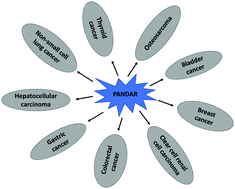PANDAR: a pivotal cancer-related long non-coding RNA in human cancers
Abstract
Long non-coding RNAs (lncRNAs), non-protein-coding RNAs that are more than 200 nucleotides in length, have been demonstrated to play a vital role in the pathophysiology of human diseases, particularly in tumorigenesis and progression of cancers. Dysregulation of lncRNAs, which serve as either oncogenes or tumor suppressor genes, is involved in diverse cellular processes, such as proliferation, dedifferentiation, migration, invasion and anti-apoptosis. Promoter of CDKN1A antisense DNA damage-activated RNA (PANDAR), which was recently found to manifest aberrant expression in various malignancies including non-small cell lung cancer, hepatocellular carcinoma, colorectal cancer and gastric cancer, is a novel cancer-related lncRNA. Deregulation of PANDAR contributes to tumorigenesis and progression of cancers, suggesting that PANDAR is likely to represent a viable biomarker and therapeutic target for human cancers. In this review, we summarize current evidence regarding the biological functions and mechanisms of PANDAR during tumor development.



 Please wait while we load your content...
Please wait while we load your content...